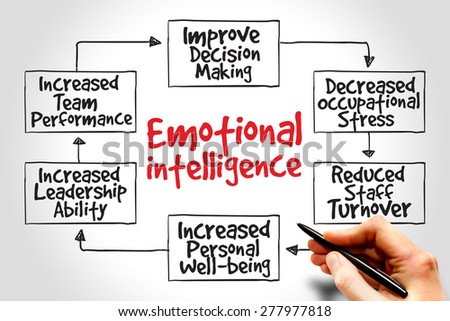 People with high emotional intelligence are good at reading people,
navigating and understanding their own feelings and interacting with
others. These are just four of the most important areas where emotional
intelligence can help:
People with high emotional intelligence are good at reading people,
navigating and understanding their own feelings and interacting with
others. These are just four of the most important areas where emotional
intelligence can help:- Stability. If you want to lead a team of employees -- or manage a community of followers -- you need to remain emotionally stable, even in times of crisis. Emotional intelligence helps you control anger, panic and despair, and remain calm no matter what.
- Sales and service. Understanding what people feel, why they feel it and what they want or need is pivotal if you want to sell products and services that people really want. It can also help you close deals once the businesses gains momentum.
- Motivation. Being able to relate to your employees and understand their feelings boosts morale and motivates those staffers to become more successful in your environment.
- Mediation and negotiation. Emotional intelligence also helps you resolve conflicts between and among employees or partners, and gives you an advantage when you're attempting to negotiate.
Signs of emotional intelligence
1. You’re able to articulate emotional experiences. We’re taught emotional vocabulary basics as young children, with words like happy, sad, silly, and mad. But how articulate are you at describing your more complex emotional experiences? An expressive and precise vocabulary is a sign that you’re introspective enough to understand your own emotions -- and how emotions work in general.
For example, you might describe something as “nostalgic” rather than “a little sad,” or feel “stress-related irritability” rather than “anger.”
2. You can pinpoint strengths and weaknesses easily (including yours). Emotionally intelligent bosses are able to quickly discover their employees’ strengths and weaknesses -- and aren’t afraid to admit their own. Everyone is good at different things, and everyone has personal shortcomings.
Ferreting these out is a sign that you pay close attention to how people interact, and you see both the bad and good in people.
Related: The Importance of Emotional Intelligence at Work
3. You’ve historically been a good judge of character. Think about the other people you’ve interacted with in the past, whether they’re former team members or friends. When you had a “good feeling” about someone, how did your relationship with them turn out?
First impressions can be deceiving, but if you have a strong history of choosing reliable, trustworthy, positive people to surround yourself with, you probably have a strong ability to judge people’s character.
4. People come to you for advice or support. How often do people in your life come to you for advice when they’re facing a tough problem? Or support when they’re going through a hard time? If lots of people do, that means they trust you not to judge them, and you probably give them valuable emotional perspective.
In other words, it’s a sign that you’re an emotionally intelligent person and that other people can see that.
5. You can let things go. All leaders experience moments of frustration, irritation, and anger, but how quickly are you able to move past yours? Are you the type of person who holds onto grudges, or the type who forgives and forgets? Do your mistakes haunt you, or do you try to work past them as quickly as possible?
Emotionally intelligent people are able to control their reactions and let things go with relative ease.
6. You generally know how others are feeling. Can you tell when your top employee is especially stressed out, even when he or she isn't explicitly acting like it? Do you notice when your friends are acting strangely, even if that activity is only slightly different from their usual behavior?
Only emotionally intelligent people notice these differences consistently.
7. You accept other beliefs, work styles and perspectives. There’s no one “right” type of professional; there are dozens, if not hundreds of acceptable beliefs, work styles and perspectives. Are you the type of person who accepts and embraces them? Or do you try to convert everyone to your specific style?
If you don’t think you exhibit these signs, don’t worry. Some people are naturally inclined to be more emotionally intelligent than others, but it’s a skill and an awareness that can be developed over time. Start by paying more attention to the thoughts, feelings and behaviors of the people around you, and make it a point to talk to strangers.
Related: 5 Reasons You Need Emotionally Intelligent Employees (and How to Find Them)
The more you focus on others’ wants, needs and perspectives, the more you’ll learn about the human condition, and the better you’ll become as a leader.



 Some of the strangest news I’ve ever seen came across my screen this week. A company in Australia is
Some of the strangest news I’ve ever seen came across my screen this week. A company in Australia is  Marcus Vipsanius Agrippa (
Marcus Vipsanius Agrippa (


















